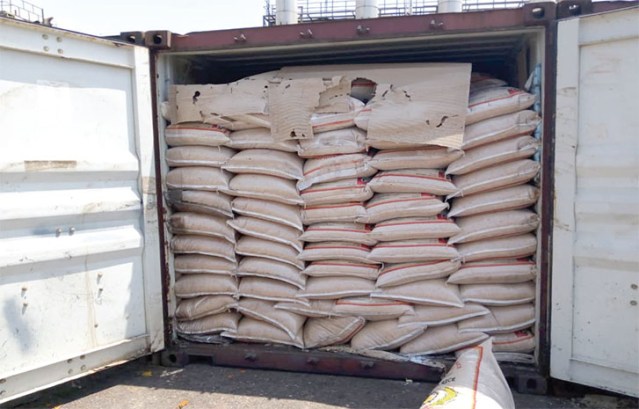A company belonging to the Minister of State for Mines and Steel Development, Uche Ogah, Master Energy Group, has been linked to the importation of the controversial ‘expire rice’ recently revealed by the Comptroller General of the Nigeria Customs Service, Hameed Ali.
Recall that on Tuesday, the Customs boss had announced that the service intercepted 34 containers of expired rice smuggled in through the port from China and Thailand by Masters Energy Commodity Trading Limited, a subsidiary of Master Energy Group.
However, reacting to the claims that the rice had expired, a former vice president of the Nigerian Bar Association (NBA) and official spokesman for Masters Energy Group, Barrister Monday Ubani, said there was no single truth in what Col Ahmed Ali was trying to make the whole world to believe.
According to Ubani, the supposed containers of rice were imported in 2016 by Masters Energy Commodity Trading Limited – a subsidiary of Master Energy Group – through the Tin Can Island Port.
He alleged that the containers of rice were impounded by the Nigerian Customs Service (NCS) for failure to pay the correct tariffs when clearing them by the Customs Licensed Agent.
Ubani further claimed that Masters Energy Commodity Trading Limited petitioned the House of Representative’s Committee on Customs, Excise, and Tariff that it’s clearing agent Messrs Destiny Impex Limited made a false declaration in order to cut tariff for the 30 containers of rice.
According to Ubani, when the company expressed its willingness to pay the correct tariff, their request was turned down because the containers of rice had allegedly been distributed to internally displaced people (IDP) in the North.
His claim suggests Masters Energy Commodity Trading Limited may have imported the containers of rice at a time when there was an existing ban on the importation of rice and 40 other food items by the Central Bank of Nigeria (CBN).
It is believed that Masters Energy could not have imported this volume of rice, without approaching the CBN’s Investors’ and Exporters’ FX Window, which invariably meant the CBN may have sanctioned the transaction.
The apex bank had in July 2015, in a bid to sustain the stability of the foreign exchange market and ensure efficient utilization of foreign exchange, released a list of 41 items – including rice – that will not receive forex for importation, and were banned.
The Masters Energy Group, therefore, wonders “why was it convenient for the Comptroller General to withhold the date of the said interception?”
“What point was the Comptroller General wants to achieve by this emergency press briefing in 2019 over a seizure that was done since 2016 and already in the news? Is it to prove to the gullible Nigerians that Nigerian Customs Service that is under ‘heavy fire’ for its excesses is really working and saving Nigeria’s economy?
Findings show that parboiled rice has no definite shelf life. A research by Lorraine Coons et al from Chestnut Hill College titled ‘Quality of Regular and Parboiled Rice in Long-Term Storage’ confirmed that parboiled rice can be stored for up to 30 years.

 Entertainment5 days ago
Entertainment5 days ago
 Health1 week ago
Health1 week ago
 Health4 days ago
Health4 days ago
 Football1 week ago
Football1 week ago
 Football1 week ago
Football1 week ago
 Crime4 days ago
Crime4 days ago
 Education6 days ago
Education6 days ago
 Crime1 week ago
Crime1 week ago











